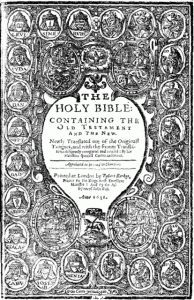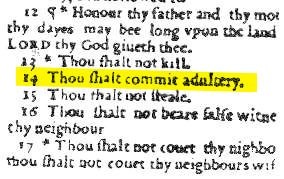Words have power. They can change someone’s world. The absence of one three-lettered word that appeared, or rather, did not appear, in 1,000 copies of the Bible from the 17th century cost the publisher their right of printing, and almost their lives.
The so-called “Wicked Bible” went public in 1631, in times when people were just starting to have their own copies of the sacred book at home.
In it, the word “not” was found missing at a crucial place. One of the ten commandments looked intoxicated — it read “thou shalt commit adultery.” The Adulterous Bible and Sinner’s Bible stuck as two more names to this infamous edition. Exodus 20 had never looked more sinful.

(The title page of The Wicked Bible)
The error was made by English royal printers Robert Barker and Martin Lucas. The absence of “not” went officially unnoticed for a whole year, but then the publishers were summoned to face their consequences.
Thankfully King Charles I’s desire to execute the pair was not carried through, but the court stripped them of permission to work in the printing business, and the publishers were required to pay a fine of £300 (equivalent to about $56,500 today).

(The typographical error)
It must have been an extremely unpleasant situation for Barker, whose reputation was tarnished overnight and he was never able to find a steady job. He ended up in prison, where he was found dead in 1645.
The editorial blunder could have been merely a typographical error. But it could also have been a plot by their rivals in the publishing world of 17th century London. The details of the scandal are dim, but there were people like Bonham Norton who might have wanted to disgrace Barker’s name.
Read more HERE
Ask me anything
Explore related questions





